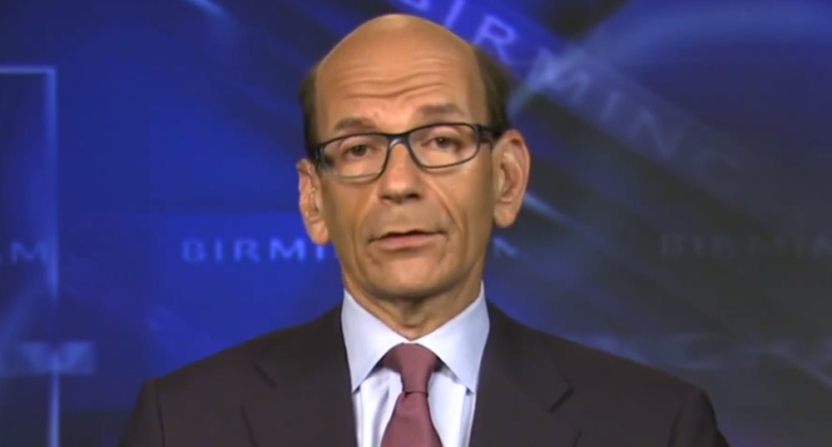The importance of reporting on schools’ violations of NCAA rules (in particular, NCAA rules on impermissible player compensation) has always been a hot topic of debate in the sports media world, as has been the manner in which that reporting is conducted. Some have argued that this reporting matters because the NCAA does have those rules and has punished schools that it has concluded have violated those policies. Others have argued that this reporting shouldn’t be done (or shouldn’t be done in some particular ways), citing the inconsistent NCAA investigation of and penalties for violations of these rules, the NCAA’s propensity to follow media reports in some cases (which means reporting is putting oneself into the story in at least some sense), and the general debate over student-athlete compensation. ESPN/SEC Network host Paul Finebaum weighed in on this front in strong terms Monday, but offered a third perspective, saying that kind of reporting ‘simply doesn’t matter anymore’ because the NCAA doesn’t punish violators enough.
What prompted this from Finebaum? It was a wide-ranging ruling from the NCAA’s Independent Resolution Panel that came down Thursday, applying to the LSU Tigers’ football and men’s basketball teams. That ruling placed both of those teams on probation for three years. It also included a 10-game suspension and a two-year show-cause order for former LSU men’s basketball head coach Will Wade. Wade was fired for cause by the school last March after receiving an official NCAA notice of allegations in the long-running saga around him, which included extensive Yahoo coverage of a FBI wiretap of him seemingly referring to an impermissible offer to a recruit. He’s now the head coach of the McNeese State Cowboys, who had previously given Wade an internal five-game suspension only two days after hiring him.
But the other part of that ruling was that the penalties LSU had self-imposed for both football and men’s basketball were sufficient. Those self-imposed penalties, only revealed Thursday as part of this ruling, included the Tigers vacating all 37 football wins they recorded from 2012-15, with that coming because former offensive lineman Vadal Alexander was ruled to be ineligible throughout his career. As per the ruling, Alexander’s family was provided $180,150 worth of embezzled funds from Baton Rouge hospitals by a LSU donor.
That infraction came under former Tigers’ football coach Les Miles, whose overall conduct at LSU (including allegations of him personally sexually harassing female students and also being part of the school’s overall “serious institutional failure” on handling Title IX complaints) was covered in a 2021 university-commissioned report, which led to Miles’ firing from his then-current job at Kansas. The 37 vacated wins drop Miles’ NCAA career record to 108–73, reducing his winning percentage to .597, just below the .600 level the College Football Hall of Fame currently requires.
The central part of this as it comes to Finebaum’s argument here is about the rest of those self-imposed penalties, though. Those include a reduction of eight football scholarships over a two-year period, which has already been done, and two men’s basketball scholarships from 2023-25 (one each year). They also included a self-imposed football postseason ban, which came in 2020 when the team was 3-5. (They finished 5-5, so they could have gone to a bowl, but that wasn’t clear at the time of the decision.) The IRP decision here noted that “The hearing panel also applied significant weight to LSU’s self-imposed penalties,” and that’s why there isn’t much extra here beyond the probationary periods for these programs. And that’s the part that bothers Finebaum, as he told Cole Cubelic and Greg McElroy on their WJOX morning show in Birmingham Monday:
View this post on Instagram
Some key quotes from Finebaum there:
“I don’t like saying this because I was one who always believed in the rules and who spent the early part of my career looking into transgressions and thinking those who did it should be kicked out of the industry. It just simply doesn’t matter anymore. …The message is clear. Cheat like crazy and don’t stop until you win. I never thought I would say that, but it’s the truth. It simply doesn’t matter anymore. …I am long past getting outraged and upset that someone like Will Wade gets away with whatever he got away with, or someone else. Because if it doesn’t matter to the people who govern the sport, and by the way, that includes everyone who sits in on these meetings and on these management councils, then it’s certainly not going to bother me anymore.”
It’s definitely interesting to hear someone as prominent as Finebaum, and someone who works for one of the NCAA’s biggest TV partners in ESPN, say that the message the NCAA is sending here is “cheat like crazy.” And it’s interesting to hear Finebaum discuss how he believes reporting on NCAA violations “simply doesn’t matter anymore,” and to hear him arguing that not from the stance that these NCAA rules are bad, but rather from the stance that they’re not going to be enforced (at least to the level he wants them to be).
That’s notable considering Finebaum’s past, too. As he says there, he did spend a lot of his early career on this front. That included work for the Birmingham Post-Herald from 1980-2001 , and saw him break the story of Alabama Crimson Tide defensive back Antonio Langham signing with an agent, which was part of the lack of institutional control penalty the NCAA hit that school with in 1995. And beyond that, Finebaum has often discussed NCAA violations on his various media platforms. So it’s certainly interesting that he’s now concluded “it simply doesn’t matter anymore.”
[Barrett Sports Media, NOLA.com]






